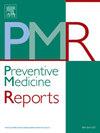北卡罗莱纳州五所大学学生食物不安全的社会人口风险因素:对水果和蔬菜摄入量以及感知健康和福祉的影响
IF 2.4
3区 医学
Q2 PUBLIC, ENVIRONMENTAL & OCCUPATIONAL HEALTH
引用次数: 0
摘要
食品不安全是美国大学生面临的一个严重的公共健康问题。我们试图了解食品不安全、相关风险因素以及对北卡罗莱纳州大学生健康行为和结果的影响。方法从5所四年制大学(4所公立/ 1所私立,3所农村/ 2所城市)的学生(N = 3043)中收集的横断面数据,评估与社会人口统计学特征、水果和蔬菜摄入量以及感知健康和福祉相关的食品安全状况。采用多项和二元逻辑回归分析来评估变量之间的统计关联,水果和蔬菜摄入量以及感知健康和幸福作为结果变量。结果近30%(29.4%)的受访者表示粮食安全状况较低或很低。在几个社会人口变量中,粮食安全状况存在统计学上的显著差异。值得注意的是,较高的食品安全状况与更经常食用水果和蔬菜的可能性增加相关;与研究生相比,本科生吃水果和蔬菜的几率更低。食物安全状况较差的受访者更有可能认为自己的健康状况较差、压力更大、睡眠质量更差。研究结果表明,那些面临社会经济困难的人更有可能在大学生时期遭遇低食品安全,这预示着水果和蔬菜的定期消费减少,健康和福祉结果更差。高等教育机构应针对这些人群制定有针对性和量身定制的干预措施,并应评估政策,以确定可能影响健康和福祉的粮食安全风险和保护因素。本文章由计算机程序翻译,如有差异,请以英文原文为准。
Socio-demographic risk factors for food insecurity among students at five North Carolina colleges: The influence on fruit and vegetable intake and perceived health and well-being
Objective
Food insecurity is a critical public health problem for U.S. college students. We sought to understand food insecurity, the associated risk factors, and the influence on health behavior and outcomes among a sample of North Carolina college students.
Methods
Cross-sectional data collected from February–April 2023 from students (N = 3043) of five four-year institutions (four public/one private, three rural/two urban) assessed food security status in relation to socio-demographic characteristics, fruit and vegetable intake, and perceived health and well-being. Multinomial and binary logistic regression analyses were performed to evaluate statistical associations between variables, with fruit and vegetable intake and perceived health and well-being as outcome variables.
Results
Nearly 30 % (29.4 %) of respondents reported low or very low food security status. Statistically significant differences were found in food security status across several socio-demographic variables. Significantly, higher food security status was correlated with increased odds of more regular consumption of fruits and vegetables; undergraduate students had decreased odds of fruit and vegetable consumption when compared to graduate students. Respondents with lower food security status had increased odds for a poorer perceived health status, higher stress, and worse sleep quality.
Conclusions
Results suggest those facing socioeconomic hardships are more likely to encounter low food security as college students, which serve as predictors for less regular consumption of fruits and vegetables and poorer health and well-being outcomes. Institutions of higher education should develop targeted and tailored interventions for these populations, and policies should be evaluated to identify risk and protective factors for food security that could impact health and well-being.
求助全文
通过发布文献求助,成功后即可免费获取论文全文。
去求助
来源期刊

Preventive Medicine Reports
Medicine-Public Health, Environmental and Occupational Health
CiteScore
3.90
自引率
0.00%
发文量
353
 求助内容:
求助内容: 应助结果提醒方式:
应助结果提醒方式:


